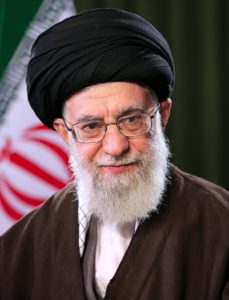May 26, 2018

Two days after US Secretary of State Mike Pompeo handed down a list of 12 demands he was making of Iran, Supreme Leader Ali Khamenehi responded with a list of four demands he is making—but his list was aimed at the European Union, not at the United States.
Khamenehi’s demands didn’t seem likely to go very far—but they may have been intended mainly to assuage domestic hardliners. In 2015, Khamenehi laid down a list of 11 demands that had to be encompassed in the nuclear deal then being negotiated or he said he would reject it. In the end, only three of the 11 demands were included—but Khamenehi still approved the deal.
The biggest single demand that Khamenehi made of Europe May 23 was that it cover any oil exports Iran might lose as a result of the Trump sanctions. In other words, Europe must not only continue to buy one-quarter of Iran’s oil exports but buy more if South Korea or Japan or some other country should reduce its Iranian oil buys.
The EU is trying to devise a payment mechanism that would allow it to keep buying Iranian oil, but there is absolutely no way it will agree to buy crude Iran cannot sell and that Europe has no need for.
Khamenehi was very blunt. “Europe should fully guarantee Iran’s oil sales. In case Americans damage our oil sales,… Europeans must make up for that and buy Iranian oil.”
Behnam Ben Taleblu, a researcher with the US-based Foundation for Defense of Democracies, said, “While Pompeo went for ‘big’ in his speech, Khamenehi seems to be going for ‘bigger’.”
Khamenehi’s other demands are:
• The Europeans must draft a resolution and introduce it in the UN Security Council declaring the Trump decision to withdraw from the nuclear agreement to be illegal. Even if the Europeans agreed to do that, it wouldn’t change anything. Furthermore, the European view is that Trump’s action, while poor policy, is not illegal.
• France, Germany and Britain must pledge that they will never again raise the issues of Iran’s missile program and Iran’s regional activities. To the EU, these are major issues. Making such a pledge would amount to complete surrender to Iran.
• European banks must agree to conduct business with Iranian banks. Most refuse to do, in part because of US sanctions and, in part, because Iran’s banking system does not adhere to many global standards—including the scale of the reserves they must keep on hand to prove they are viable. The EU cannot order its banks to do business with anyone, so this demand is a non-starter.
The very next day, Russian President Vladimir Putin effectively repudiated one of Khamenehi’s demands. After three hours of talks with French President Emmanuel Macron, Putin said, “I agree that we can talk about Iran’s missile program as well as about the situation in the region and about its nuclear activities beyond 2015 [when the first restrictions imposed by the nuclear deal come off].”
Khamenehi indicated that if Europe did not agree to his demands, then the Islamic Republic would withdraw from the nuclear agreement. The United States couldn’t care less if Iran did that, but the Europeans would be irate. Many analysts have argued Iran has nothing to gain and much to lose by dropping out of the agreement. Europe might even resume sanctions.
